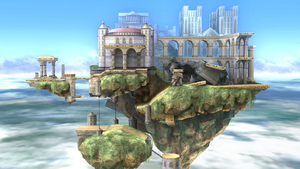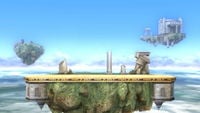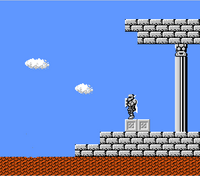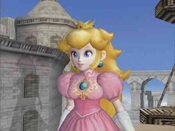| Welcome to SmashWiki! Log in or create an account and join the community, and don't forget to read this first! |
| Notices |
|---|
| The Skill parameter has been removed from Smasher infoboxes, and in its place are the new "Best historical ranking" and "Best tournament result" parameters. SmashWiki needs help adding these new parameters to Smasher infoboxes, refer to the guidelines here for what should be included in these new parameters. |
| When adding results to Smasher pages, include each tournament's entrant number in addition to the player's placement, and use the {{Trn}} template with the matching game specified. Please also fix old results on Smasher pages that do not abide to this standard. Refer to our Smasher article guidelines to see how results tables should be formatted. |
| Check out our project page for ongoing projects that SmashWiki needs help with. |
Temple: Difference between revisions
Aidanzapunk (talk | contribs) m (Undid edit by Nymbare: ) |
m (Added "Ultimate" to list of games its in) |
||
| Line 6: | Line 6: | ||
|caption = [[Image:ZeldaSymbol.svg|50px]] | |caption = [[Image:ZeldaSymbol.svg|50px]] | ||
|universe = ''{{uv|The Legend of Zelda}}'' | |universe = ''{{uv|The Legend of Zelda}}'' | ||
|games = ''[[Melee]]''<br/>''[[Brawl]]''<br/>''[[SSB4]]'' ([[SSBWU|Wii U]]) | |games = ''[[Melee]]''<br/>''[[Brawl]]''<br/>''[[SSB4]]'' ([[SSBWU|Wii U]])<br>''[[Ultimate]]'' | ||
|hometo = '''Melee:'''<br/>{{SSBM|Link}} (Classic)<br/>{{SSBM|Zelda}}/{{SSBM|Sheik}} (Classic/All-Star)<br/>{{SSBM|Young Link}} (Classic)<br/>{{SSBM|Marth}} ([[All-Star Match]])<br/>{{SSBM|Roy}} (Unlocking)<br/>'''Brawl:'''<br/>{{SSBB|Link}}<br/>{{SSBB|Zelda}}/{{SSBB|Sheik}}<br/>{{SSBB|Ganondorf}}<br/>{{SSBB|Toon Link}}<br/>'''SSB4:''' <br/>{{SSB4|Link}}<br/>{{SSB4|Zelda}}<br/>{{SSB4|Sheik}}<br/>{{SSB4|Ganondorf}}<br/>{{SSB4|Toon Link}} | |hometo = '''Melee:'''<br/>{{SSBM|Link}} (Classic)<br/>{{SSBM|Zelda}}/{{SSBM|Sheik}} (Classic/All-Star)<br/>{{SSBM|Young Link}} (Classic)<br/>{{SSBM|Marth}} ([[All-Star Match]])<br/>{{SSBM|Roy}} (Unlocking)<br/>'''Brawl:'''<br/>{{SSBB|Link}}<br/>{{SSBB|Zelda}}/{{SSBB|Sheik}}<br/>{{SSBB|Ganondorf}}<br/>{{SSBB|Toon Link}}<br/>'''SSB4:''' <br/>{{SSB4|Link}}<br/>{{SSB4|Zelda}}<br/>{{SSB4|Sheik}}<br/>{{SSB4|Ganondorf}}<br/>{{SSB4|Toon Link}} | ||
|availability = [[Starter Stage|Starter]] (''Melee'', ''Brawl'', and ''SSB4'') | |availability = [[Starter Stage|Starter]] (''Melee'', ''Brawl'', and ''SSB4'') | ||
Revision as of 07:18, June 13, 2018
| Temple | |
|---|---|
 
| |
| Universe | The Legend of Zelda |
| Appears in | Melee Brawl SSB4 (Wii U) Ultimate |
| Availability | Starter (Melee, Brawl, and SSB4) |
| Crate type | Normal |
| Maximum players | 8 |
| Tracks available | In Melee: Temple Fire Emblem (Alternate) In Brawl: Temple (Melee) Great Temple/Temple In SSB4: Great Temple / Temple Full Steam Ahead (Spirit Tracks) Temple Theme Main Theme (The Legend of Zelda) Song of Storms The Dark World Gerudo Valley Dragon Roost Island Hyrule Main Theme Yuga Battle (Hyrule Castle) Bolded tracks must be unlocked |
| Article on Zelda Wiki | Dungeons in Zelda II: The Adventure of Link |
Temple (神殿, Temple) is a stage introduced in Super Smash Bros. Melee, which returns in Super Smash Bros. Brawl as a Melee Stage, and in Super Smash Bros. for Wii U as a familiar stage. It is commonly known as Hyrule Temple (this name appears in Melee's instruction booklet at page 49), though its proper name is Temple (since "Hyrule" denotes Temple's location). Temple was first announced at E3 2001.
Stage Description
Temple is one of the eighteen default stages available in Super Smash Bros. Melee. It is a Legend of Zelda stage on which characters from that franchise (along with the characters from the Fire Emblem franchise) will usually battle the player in the single player modes. The layout is based on the palaces from Zelda II: The Adventure of Link.
In Melee's All-Star mode, this stage is played on when Zelda and her teammates are fought. It is also where Zelda will fight in Classic Mode and will sometimes play the song "Lost Woods", from The Legend of Zelda: Ocarina of Time.
In Super Smash Bros. Brawl, the stage no longer has a chance of playing the "Fire Emblem" medley theme from Melee, because the track has moved to the Fire Emblem-themed Castle Siege stage. A remix of the "The Great Temple" theme from Zelda II: The Adventure of Link can be obtained to play on this stage in My Music, making it the only Melee stage that has a new piece of music available to play on it. In Brawl, the ledge on the right hand side can no longer be grabbed on the larger bottom platform as it could in Melee.
Fight Club
The underground area on the stage is referred to by Nintendo Power as the "Fight Club". It is termed so because battles there tend to produce disproportionately high damage totals because the surrounding environment has walls on all sides that can be teched on, which keeps characters from leaving the stage and greatly increasing the difficulty of KOing them. The ease in which a high damaged character can survive in the Fight Club can often lead to players turtling inside. The area is also known by a variety of other nicknames by players.
Hyrule Jump
Due to its immense size and its structure, Temple is a stage where notable feats involving the traversing of large area are performable, such as the Hyrule Jump and, as of Brawl, gliding completely around the stage.
Tournament legality
As an extremely large stage, it is banned in all serious tournaments in every game it is featured in because its size and build provides opportunities for what is perceived broken camping and stalling. The many walls allow for wall infinites, and the underground section creates a large cave of life, allowing characters to live to extremely high damages that are effectively impossible to reach in normal conditions. The geometry of the stage also allows players to circle camp endlessly with characters such as Meta Knight or Jigglypuff, encouraging extremely slow hit-and-run matches, as well as favoring stalling. As a result of having areas where the upper blast line is much closer to the stage than the horizontal blast lines, this stage also gives characters with powerful vertical finishers a benefit over those with powerful horizontal finishers.
Ω Form
The Omega form is set on a much smaller stage retaining some of the designs from the original stage. The original stage can be seen in the background, split up.
Origin
This stage is from Zelda II: The Adventure of Link. In The Legend of Zelda: Ocarina of Time, the name of the dungeons is based off of the type of environment around it or the location with "Temple" at the end. However, in Zelda II, these dungeons are called "Palaces". Hyrule is where the Temple is located, hence Hyrule Temple. In Zelda II every palace begins with two high steps with a statue standing on the top platform. There are also some columns on the floor that hold the ceiling up. Shortly after going past the columns is an elevator that takes the player down to the level below. This stage features a rounded platform on the left and there are also columns that holds a platform up, with a route that goes down to the level below. However, there is no elevator going down to the area below. The palaces in Zelda II are notorious for their many levels and the length of the levels themselves. This stage being by far the largest stage in Melee is similar to the immense size of Zelda II's palaces. In the overworld map of Zelda II there is an icon that represents the palaces. The icon is a building supported by columns. In the far background of this stage can be seen a small building that is supported by columns. The platforms on this stage has Hylian writing on them. In Melee, the writing looks similar to the Hylian language in Ocarina of Time. [1] In Brawl and Wii U, it is the language from The Wind Waker.
A structure behind the top right segment of Temple looks similar to the Temple of Time from The Legend of Zelda: Ocarina of Time, without the open door and the Triforce symbol.
Temple Race
Temple Race is a method of gameplay in Super Smash Bros. Melee that could be considered as a Special Melee, though it must be set up through manual means. The mode features no specific data within Melee, but gameplay of the mode is explained in the instruction booklet. The mode would only be possible with human players, as there are no CPU commands to co-operate with this type of Melee.
How to Play
The suggested way to play Temple Race is to first set up a timed match on the Temple stage, with any time limit being allowed. The players must then choose the layout of a course, some of which may require usage of the Hyrule Jump, and then the player that can complete most laps of this chosen layout within the designated time limit is declared the winner.
Description in the Instruction Booklet
Play a MELEE battle in Time Mode. Set the time and choose the HYRULE TEMPLE stage. Choose a particular route, then see who can complete the most laps within the time limit.
Gallery
Bowser, Wario, and Diddy Kong in Temple as it appears in Super Smash Bros. Brawl.
- SSBU Temple.jpg
Toon Link and Charizard on Temple in Super Smash Bros. for Wii U.
The Temple as it appears in Super Smash Bros. for Wii U, along with Toon Link and Link.
Videos
Trivia
- In Melee, if Sheik's Chain is used in the correct spot in the tunnel of Temple, the tip of the chain will stick to the roof of the tunnel and make a straight line from her hand to the roof. This is sometimes referred to as the Sticky Chain glitch. In Brawl, there is another glitch involving Sheik's Chain when used in the right position on the stone slab to the right of the entrance to the underground area. If performed correctly, the chain makes a high pitched sound that is different from the usual sound produced.
- In Melee, Temple is notorious for exploiting the flawed AI. One such example is if Jigglypuff and Kirby are knocked off the left side of the lower part of the stage, they will attempt to return using their multiple midair jumps, but will sometimes get stuck on the slight overhang above. This is usually not fatal to Jigglypuff, as it will often glide back to the platform after its jumps are exhausted, but Kirby will use his Final Cutter and fall straight down for a SD. Another notable example is where Fox as a level 9 CPU cannot escape from the lower area of the stage if the player is on the top area, as it will attempt to jump on the path leading to the top but fail, walk side to side on the bottom, fall off the right side, use Fire Fox to get back up, and repeat. With the improved AI, these specific CPU exploits do not occur in Brawl.
- In the "Special Video" of Melee, during two clips of Temple, two odd platforms can be seen, which do not appear on the stage in Melee, Brawl, or Smash 4. The same platforms can be seen in the short video clip after beating a single player mode as Luigi as well as in the manual's picture depicting Fixed-Camera Mode.
- Along with the platforms, early versions of the game featured an elevator to lead to the bottom of the stage; this does not appear in the finished form of the game.
- If Pokémon Trainer is chosen, he stands on top of the arches in the middle section of the stage.
- If Sonic releases his Spin Dash while facing right on the stairs to the left of the large floating platform, he will shoot horizontally across the stage, going over any gaps, ignoring gravity, and self destruct.
- This is the only Melee stage in Brawl that has at least one track that isn't from Melee.
- In the PAL Spanish version of Smash 4, the name for this stage is taken from Summit.
- This is one of the two familiar stages in SSB4 to not appear in Classic Mode or All-Star Mode. The other is 75m.
| show Stages in Super Smash Bros. Melee |
|---|
| show Stages in Super Smash Bros. Brawl |
|---|
| show Stages in Super Smash Bros. 4 |
|---|
| show
|
|---|










